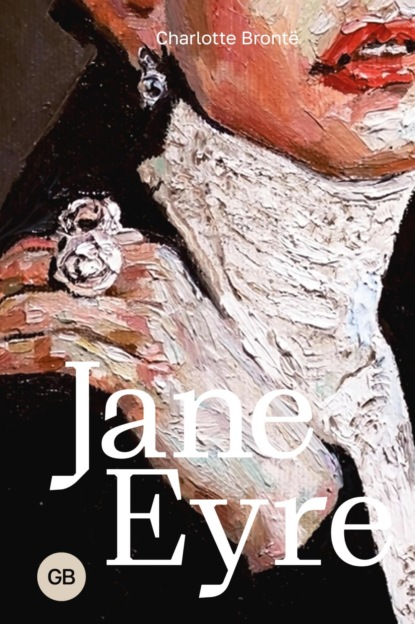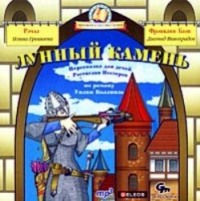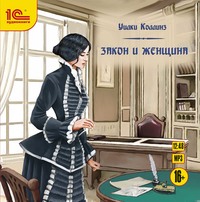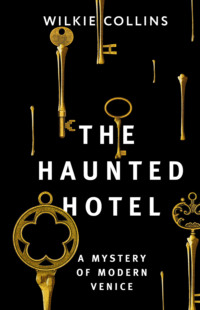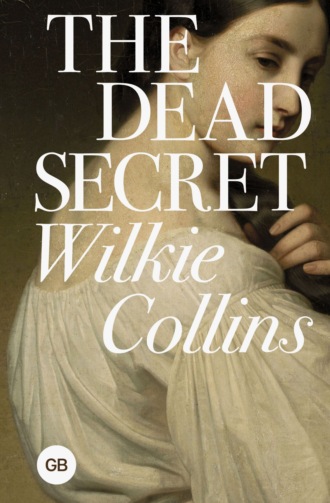
Полная версия
The Dead Secret / Тайна
Shrowl shifted the gridiron to a clear place in the fire, and chuckled sarcastically.
“Who the devil would you have me leave my money to?” cried Mr. Treverton, overhearing him. “To my brother, who thinks me a brute now; who would think me a fool then; and who would encourage swindling, anyhow, by spending all my money among doxies and strolling players? To the child of that player-woman, whom I have never set eyes on, who has been brought up to hate me, and who would turn hypocrite directly by pretending, for decency's sake, to be sorry for my death? To you, you human baboon! – you, who would set up a usury office directly, and prey upon the widow, the fatherless, and the unfortunate generally, all over the world? Your good health, Mr. Shrowl! I can laugh as well as you – especially when I know I'm not going to leave you sixpence.”
Shrowl, in his turn, began to get a little irritated now. The jeering civility which he had chosen to assume on first entering the room gave place to his habitual surliness of manner and his natural growling intonation of voice.
“You just let me alone – will you?” he said, sitting down sulkily to his breakfast. “I've done joking for to-day; suppose you finish too. What's the use of talking nonsense about your money? You must leave it to somebody.”
“Yes, I will,” said Mr. Treverton. “I will leave it, as I have told you over and over again, to the first Somebody I can find who honestly despises money, and who can't be made the worse, therefore, by having it.”
“That means nobody,” grunted Shrowl.
“I know it does!” retorted his master.
Before Shrowl could utter a word of rejoinder, there was a ring at the gate-bell of the cottage.
“Go out,” said Mr. Treverton, “and see what that is. If it's a woman visitor, show her what a scarecrow you are, and frighten her away. If it's a man visitor —”
“If it's a man visitor,” interposed Shrowl, “I'll punch his head for interrupting me at my breakfast.”
Mr. Treverton filled and lit his pipe during his servant's absence. Before the tobacco was well alight, Shrowl returned, and reported a man visitor.
“Did you punch his head?” asked Mr. Treverton.
“No,” said Shrowl. “I picked up his letter. He poked it under the gate and went away. Here it is.”
The letter was written on foolscap paper, superscribed in a round legal hand. As Mr. Treverton opened it, two slips cut from newspapers dropped out. One fell on the table before which he was sitting; the other fluttered to the floor. This last slip Shrowl picked up and looked over its contents, without troubling himself to go through the ceremony of first asking leave.
After slowly drawing in and slowly puffing out again one mouthful of tobacco-smoke, Mr. Treverton began to read the letter. As his eye fell on the first lines, his lips began to work round the mouth-piece of the pipe in a manner that was very unusual with him. The letter was not long enough to require him to turn over the first leaf of it – it ended at the bottom of the opening sheet. He read it down to the signature – then looked up to the address, and went through it again from the beginning. His lips still continued to work round the mouth-piece of the pipe, but he smoked no more. When he had finished the second reading, he set the letter down very gently on the table, looked at his servant with an unaccustomed vacancy in the expression of his eyes, and took the pipe out of his mouth with a hand that trembled a little.
“Shrowl,” he said, very quietly, “my brother, the Captain, is drowned.”
“I know he is,” answered Shrowl, without looking up from the newspaper-slip. “I'm reading about it here.”
“The last words my brother said to me when we quarreled about the player-woman,” continued Mr. Treverton, speaking as much to himself as to his servant, “were that I should die without one kind feeling in my heart toward any living creature.”
“So you will,” muttered Shrowl, turning the slip over to see if there was any thing worth reading at the back of it.
“I wonder what he thought about me when he was dying?” said Mr. Treverton, abstractedly, taking up the letter again from the table.
“He didn't waste a thought on you or any body else,” remarked Shrowl. “If he thought at all, he thought about how he could save his life. When he had done thinking about that, he had done living too.” With this expression of opinion Mr. Shrowl went to the beer-barrel, and drew his morning draught.
“Damn that player-woman!” muttered Mr. Treverton. As he said the words his face darkened and his lips closed firmly. He smoothed the letter out on the table. There seemed to be some doubt in his mind whether he had mastered all its contents yet – some idea that there ought to be more in it than he had yet discovered. In going over it for the third time, he read it to himself aloud and very slowly, as if he was determined to fix every separate word firmly in his memory. This was the letter:
“Sir, – As the old legal adviser and faithful friend of your family, I am desired by Mrs. Frankland, formerly Miss Treverton, to acquaint you with the sad news of your brother's death. This deplorable event occurred on board the ship of which he was captain, during a gale of wind in which the vessel was lost on a reef of rocks off the island of Antigua. I inclose a detailed account of the shipwreck, extracted from The Times, by which you will see that your brother died nobly in the performance of his duty toward the officers and men whom he commanded. I also send a slip from the local Cornish paper, containing a memoir of the deceased gentleman.
“Before closing this communication, I must add that no will has been found, after the most rigorous search, among the papers of the late Captain Treverton. Having disposed, as you know, of Porthgenna, the only property of which he was possessed at the time of his death was personal property, derived from the sale of his estate; and this, in consequence of his dying intestate, will go in due course of law to his daughter, as his nearest of kin.
“I am, Sir, your obedient servant, “Alexander Nixon.”
The newspaper-slip, which had fallen on the table, contained the paragraph from The Times. The slip from the Cornish paper, which had dropped to the floor, Shrowl poked under his master's eyes, in a fit of temporary civility, as soon as he had done reading it. Mr. Treverton took not the slightest notice either of the one paragraph or the other. He still sat looking at the letter, even after he had read it for the third time.
“Why don't you give the strip of print a turn, as well as the sheet of writing?” asked Shrowl. “Why don't you read about what a great man your brother was, and what a good life he led, and what a wonderful handsome daughter he's left behind him, and what a capital marriage she's made along with the man that's owner of your old family estate? She don't want your money now, at any rate! The ill wind that blowed her father's ship on the rocks has blowed forty thousand pounds of good into her lap. Why don't you read about it? She and her husband have got a better house in Cornwall than you have got here. Ain't you glad of that? They were going to have repaired the place from top to bottom for your brother to go and live along with 'em in clover when he came back from sea. Who will ever repair a place for you? I wonder whether your niece would knock the old house about for your sake, now, if you was to clean yourself up and go and ask her?”
At the last question, Shrowl paused in the work of aggravation – not for want of more words, but for want of encouragement to utter them. For the first time since they had kept house together, he had tried to provoke his master and had failed. Mr. Treverton listened, or appeared to listen, without moving a muscle – without the faintest change to anger in his face. The only words he said when Shrowl had done were these two —
“Go out!”
Shrowl was not an easy man to move, but he absolutely changed color when he heard himself suddenly ordered to leave the room.
“Go out!” reiterated Mr. Treverton. “And hold your tongue henceforth and forever about my brother and my brother's daughter. I never have set eyes upon the player-woman's child, and I never will. Hold your tongue – leave me alone – go out!”
“I'll be even with him for this,” thought Shrowl as he slowly withdrew from the room.
When he had closed the door, he listened outside of it, and heard Mr. Treverton push aside his chair, and walk up and down, talking to himself. Judging by the confused words that escaped him, Shrowl concluded that his thoughts were still running on the “player-woman” who had set his brother and himself at variance. He seemed to feel a barbarous sense of relief in venting his dissatisfaction with himself, after the news of Captain Treverton's death, on the memory of the woman whom he hated so bitterly, and on the child whom she had left behind her.
After a while the low rumbling tones of his voice ceased altogether. Shrowl peeped through the key-hole, and saw that he was reading the newspaper-slips which contained the account of the shipwreck and the Memoir of his brother. The latter adverted to some of those family particulars which the vicar of Long Beckley had mentioned to his guest; and the writer of the Memoir concluded by expressing a hope that the bereavement which Mr. and Mrs. Frankland had suffered would not interfere with their project for repairing Porthgenna Tower, after they had gone the length already of sending a builder to survey the place. Something in the wording of that paragraph seemed to take Mr. Treverton's memory back to his youth-time when the old family house had been his home. He whispered a few words to himself which gloomily referred to the days that were gone, rose from his chair impatiently, threw both the newspaper-slips into the fire, watched them while they were burning, and sighed when the black gossamer ashes floated upward on the draught, and were lost in the chimney.
The sound of that sigh startled Shrowl as the sound of a pistol-shot might have startled another man. His bull-terrier eyes opened wide in astonishment, and he shook his head ominously as he walked away from the door.
Chapter II
Will They Come?
The housekeeper at Porthgenna Tower had just completed the necessary preparations for the reception of her master and mistress, at the time mentioned in Mrs. Frankland's letter from St. Swithin's-on-Sea, when she was startled by receiving a note sealed with black wax, and surrounded by a thick mourning border. The note briefly communicated the news of Captain Treverton's death, and informed her that the visit of Mr. and Mrs. Frankland to Porthgenna was deferred for an indefinite period.
By the same post the builder, who was superintending the renovation of the west staircase, also received a letter, requesting him to send in his account as soon as the repairs on which he was then engaged were completed; and telling him that Mr. Frankland was unable, for the present, to give any further attention to the project for making the north rooms habitable. On the receipt of this communication, the builder withdrew himself and his men as soon as the west stairs and banisters had been made secure; and Porthgenna Tower was again left to the care of the housekeeper and her servant, without master or mistress, friends or strangers, to thread its solitary passages or enliven its empty rooms.
Конец ознакомительного фрагмента.
Текст предоставлен ООО «Литрес».
Прочитайте эту книгу целиком, купив полную легальную версию на Литрес.
Безопасно оплатить книгу можно банковской картой Visa, MasterCard, Maestro, со счета мобильного телефона, с платежного терминала, в салоне МТС или Связной, через PayPal, WebMoney, Яндекс.Деньги, QIWI Кошелек, бонусными картами или другим удобным Вам способом.




